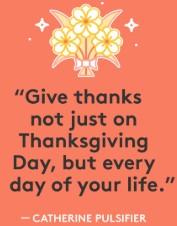 November offers many opportunities for gratitude to people and events in our past, present, and future. November is National Native American Heritage Month, which celebrates and honors the cultures and
November offers many opportunities for gratitude to people and events in our past, present, and future. November is National Native American Heritage Month, which celebrates and honors the cultures and contributions of Native Americans and Alaska Natives. November also highlights Veterans Day (November 11th), World Kindness Day (November 13th), Transgender Day of Remembrance (November 20th), and Thanksgiving. National recognition days are important to honor specific populations and happenings but how often do we practice daily gratitude? During Yoga teacher classes, we were asked to get into the habit of completing daily activities during our 200 hour training. One of the activities was visualizing 3 things in our life that we were grateful for. Sounds easy, right? As a society, we can quickly pinpoint the negatives in a situation but how easily can we highlight the positives? Practicing gratitude every day can help you feel more positive, improve your health, and build strong relationships. Research shows that people who practice gratitude are happier, less anxious, and more hopeful. Gratefulness can help reduce stress and depression, lower blood pressure, and increase energy. As we barrel towards 2025 and resolutions, consider adding a moment to your daily chaos to reflect on what you are thankful for.
contributions of Native Americans and Alaska Natives. November also highlights Veterans Day (November 11th), World Kindness Day (November 13th), Transgender Day of Remembrance (November 20th), and Thanksgiving. National recognition days are important to honor specific populations and happenings but how often do we practice daily gratitude? During Yoga teacher classes, we were asked to get into the habit of completing daily activities during our 200 hour training. One of the activities was visualizing 3 things in our life that we were grateful for. Sounds easy, right? As a society, we can quickly pinpoint the negatives in a situation but how easily can we highlight the positives? Practicing gratitude every day can help you feel more positive, improve your health, and build strong relationships. Research shows that people who practice gratitude are happier, less anxious, and more hopeful. Gratefulness can help reduce stress and depression, lower blood pressure, and increase energy. As we barrel towards 2025 and resolutions, consider adding a moment to your daily chaos to reflect on what you are thankful for.
Thank you for the passion, commitment, and thoughtfulness that each of you bring day after day.
In gratitude … Amy and Yerson
Family First, Core Services, and Program Area 3
The Child Welfare Prevention Task Group (CWPTG) wishes everyone a happy and safe holiday season. The group will reconvene on February 14, 2025 from 1:30 to 3:00.
With Teri Haymond’s departure, there is an open Tri-chair seat. Contact Amy Sciangula if you are interested in nominating yourself or someone. Email Amy Sciangula if you have a topic for the agenda or would like an educational piece added to the February meeting.
- Our Federal Partners have started their review of Colorado’s submitted plan to introduce Community Pathways through SafeCare. This would introduce a path to 50% reimbursement, or .50 on every dollar spent on Evidence-Based Services in the Colorado Prevention Plan WITHOUT child welfare involvement being required.
- In Colorado, families of all social statuses often face the challenge of navigating a complex web of systems to access essential services and support for their children. From programs like WIC (Women, Infants, and Children), SNAP (Supplemental Nutrition Assistance Program), TANF (Temporary Assistance for Needy Families), Medicaid, to Child Welfare, and support for children with IEPs (Individualized Education Plan), Read Plans, or developmental disabilities, the journey can be overwhelming. The Story of the System Project delves into the lived experiences of families as they navigate these intricate systems and offers insights into how they can be better supported.
- We field a lot of questions about how to use Special Economic Assistance (SEA). Yerson Padilla has created a guide to help guide use of SEA and we anticipate it will be through the clearance process in time for the December newsletter. Until then, please continue to send us your questions if you are unsure. A question to ask yourself when using SEA is, “Will the use of these funds purchase or pay for something that will help a child remain in their home safely or return home from out-of-home placement safely?” Examples of when SEA should not be used include purchasing a meal or item for a child just removed from their home, caseworker expenses, or payment for out-of-home placement.
- Do you look at your yearly CSU evaluation and think, “What do I do with this?” Marc Winokur from CSU is available to set-up a one-hour deep dive into your county-specific Core Services report. These deep dives are valuable to review annual and longitudinal outcomes and how they can inform your Core Services program and Plan. Email Marc at marc.winokur@colostate.edu to schedule a time.
- What the heck is a BHASO and how might it impact services in your community? Kayla Martin with the Behavioral Health Alliance (BHA) is prepared to share answers. Be sure to join us at the January 27th Core Quarterly to gain a better understanding of Behavioral Health Administration Service Organizations (BHASO) before they are launched July 1, 2025. Please send any questions you have ahead of time to Amy Sciangula so Kayla will have time to research areas she may not be aware of. Take a moment to review information about BHASOs and the BHA Plans and Reports prior to the meeting.
- As we look ahead to 2025, it’s time to add scheduled Core Quarterly meetings to your new calendars. These sessions are essential for aligning Core Services across the state. Meetings are Hybrid (in-person and online) and when possible, we encourage you to attend sessions in person. Agendas are shared prior to the meeting, so please let Yerson Padilla know if you have a topic to add or need a specific educational piece. As a reminder, here are the dates, times, and location for each quarterly meeting in 2025:
● January 27th, 2025 Morgan County (Fort Morgan, CO) from 2:00pm – 3:30pm
● April 28th, 2025 Garfield County (Rifle, CO) from 2:00pm – 3:30pm
● July 28th, 2025 La Plata/San Juan Counties (Durango, CO) from 2:00pm – 3:30pm
● October 27th, 2025 Las Animas County (Trinidad, CO) from 2:00pm – 3:30pm
Memo Spotlight –
Title: Colorado Division of Child Welfare 2023 Annual Report
Memo number: IM-CW-2024-0042
In an effort to provide full transparency to all counties, providers, and public partners, the Division of Child Welfare developed an annual report for calendar year 2023 to highlight the work that is being done in all units across the Division to advance child welfare dialogue, collaboration, and priorities in Colorado. The report highlights the ways in which DCW has undergone a paradigm shift in recent years using data, analysis, and partner input to make necessary changes across its relationships with key partners to promote high-quality and responsive child welfare practice, services, and support – all with the focus that children, youth, and families know what they need to be successful. The report outlines the ways in which the Division is working to proactively strengthen families and keep them safely together while building up family-like settings and time-limited, individualized, trauma-informed treatment as the Division adapts the way it approaches the work and refines goals for the future.
**Just Released**
Title: Data Sharing between County Child Welfare and Regional Accountability Entities
Memo number: OM-CW-2024-0016
County Space – Email Amy Sciangula or Yerson Padilla your news, ideas, or questions.
November is National American Indian Heritage Month! Colorado is home to several indigenous nations including Apache, Comanche, Shoshone, and Ute. Both the Southern Ute Indian Tribe and Ute Mountain Ute Tribe are federally recognized tribes in the State of Colorado. If you are ever in Denver, you can visit the History Colorado Center, Native American Trading Company, and Denver Art Museum to learn more about the area’s historical and current indigenous populations. We are proud to work with our federally recognized tribes. Each year the Southern Ute Indian Tribe and Ute Mountain Ute Tribe are provided Core Services Funding of $25,000 each. The Tribes can utilize funding to provide Core Services to their respective communities.
Resources
- The Medicaid Specialist Team is happy to announce that they have a central email address. If you are experiencing barriers or have a question about Medicaid in accessing needed services, please send an email to: cdhs_childyouth_medicaidassistance@state.co.us.
- 211 Colorado
- Family First Dashboard – Track Colorado’s implementation progress.
- Colorado Family First Website
- Colorado Connected offers tools for community organizations to foster connections. Activities and easy to use toolkits are available on-line, free of charge.
- Free and low-cost help: BHA Community Services
Training, Funding, and Job Opportunities
- Mindspring Mental Health Alliance – free, virtual training
- The Colorado Sexual Health Initiative (CoSHI) is hosting a workshop called Beyond the Birds and the Bees: Becoming a truly askable adult. It is a two-hour workshop intended to help adults develop the skills and knowledge to discuss puberty, sexual health, relationships, consent, and other sensitive topics calmly and effectively.
- Youth Mental Health & Wellbeing Challenge Grant – Colorado Department of Law (DOL)
- Grants.gov – forecasted funding opportunities and open Notices of Funding Opportunities (NOFOs)
- Diversion Systems and Project Coordinator – Adams County
- Emergency Response Team Social Case Worker – Denver County
- OASOS (Open and Affirming Sexual Orientation [and gender identity] Support) Program Manager – Boulder County
- Kinship Coordinator – Garfield County
- Adult and Family Services Case Worker – Kit Carson
- Social Case Worker Protective Services – Pueblo
